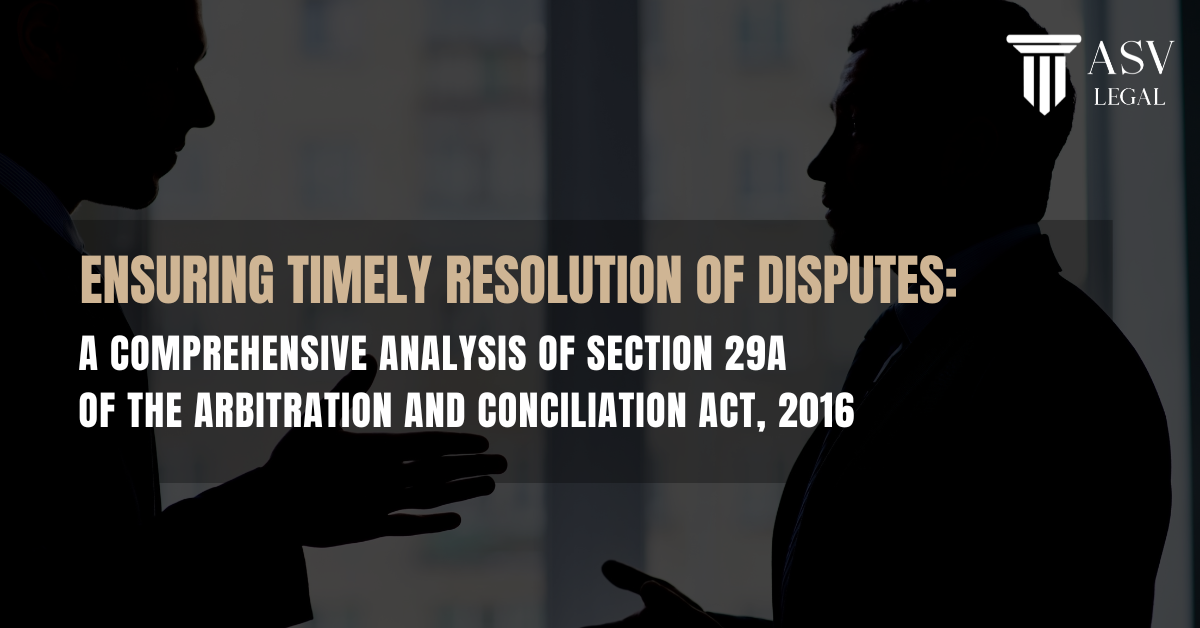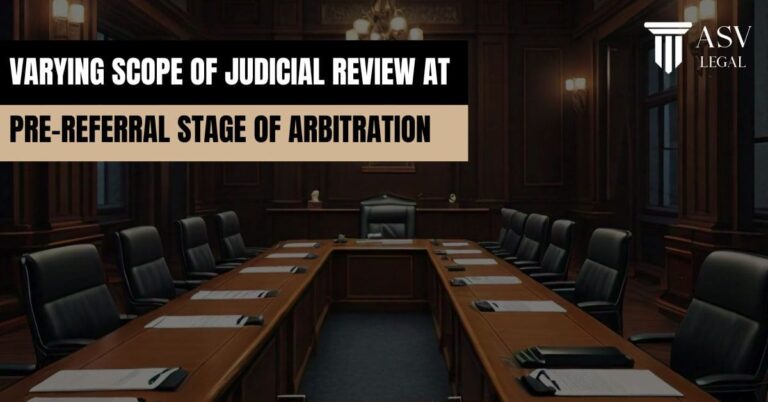Written By: Nishtha Kaura (Senior Associate) & Aastha Arora (Associate)
Arbitration has become a preferred mode of dispute resolution, especially in commercial matters, owing to its efficiency and flexibility compared to traditional litigation. However, like any system, it is not immune to delays. In India, arbitration proceedings have often been criticized for being drawn out, leading to significant delays in the resolution of disputes. This defeats the very purpose of choosing arbitration over litigation. Recognizing this concern, the Indian legislature introduced Section 29A of the Arbitration and Conciliation Act, 1996 through the Arbitration and Conciliation (Amendment) Act, 2015, which came into force in 2016. The aim of Section 29A of the Arbitration and Conciliation Act, 1996 (“said Act”) is to streamline arbitration proceedings and ensure that disputes are resolved in a time-bound manner.
Background and Rationale for Section 29A of the said Act
Before the introduction of Section 29A of the said Act, arbitration proceedings in India had no statutory time limit for making an arbitral award. Parties and arbitrators were often responsible for prolonged delays, and as a result, arbitration in India began to lose its appeal as a quick and efficient method of dispute resolution. In fact, the growing backlog in the Indian judiciary further exacerbated the situation when parties resorted to post-arbitral litigation.
The Arbitration and Conciliation (Amendment) Act, 2015 sought to address these concerns by introducing a host of reforms aimed at making arbitration more efficient, expeditious, and cost-effective. One of the key provisions introduced through this amendment was Section 29A, which mandates a time limit for the completion of arbitration proceedings without any unnecessary adjournments and delay.
Section 29A of the said Act envisages two time limits for making of an arbitral award. First, section 29A(1) of the said Act states that an award shall be made by the arbitral tribunal within a period of twelve months. Secondly, section 29A(3) of the said Act stipulates that the parties by consent can extend the time for making the award beyond twelve months upto an additional period of six months. However, if the award is not made within the period of twelve months or extended period of six months, would the mandate of the arbitral tribunal subject to further extension in terms of the provisions of the said Act.
“Further Extension” of Time in Terms of Provisions of The Act
Sub section (4) of section 29A[1] of the Act states that where the award is not made within the specified period of twelve or eighteen months, the mandate of the arbitral tribunal will terminate. However, this provision does not apply if the court has extended the period, either before or after the expiry of the initial or the extended term. In other words, section 29A(4) of the Act empowers the court to extend the period for making of the arbitral award beyond a period of twelve months or eighteen months, as the case maybe. The further extension of time is to be granted by the court upon an application filed by either of parties, only for ‘sufficient cause’ and on such terms and conditions as may be imposed by the court in terms of section 29A(4) and section 29A(5) of the said Act.
The controversy emanating from the provision was whether an application for extension of time under section 29A of the said Act, can be filed after the expiry of the period for making of the arbitral award. Different High Courts have given different interpretation to this provision. Hon’ble Calcutta High Court[2] held that once the mandate of the arbitral tribunal is terminated by afflux of time of twelve months, or when so consented to by the parties after a further six month extension, the power of the court to extend time under section 29A(4) of the Act cannot be invoked. Similar view has been taken by a Division Bench of the High Court of Judicature at Patna[3]. However, catena of judgments from other High Court[4] have taken an opposite view that an application for extension of time limit for arbitral award can be filed by a party even after expiry of the term of twelve months or the extended period of six months.
Ultimately, the Apex Court brought an end to the controversy emanating from the interpretation of section 29A(4) of the Act in Rohan Builders (India) Private Limited vs. Berger Paints India Limited[5]. In the said ruling, the Apex Court held that an application for extension of the time period for passing an arbitral award under section 29A(4) read with section 29A(5) is maintainable even after the expiry of the twelve month or the extended six month period, as the case may be. The court while adjudicating such extension applications will be guided by the principle of sufficient cause. Such extension is not granted mechanically on filing the application. Further, the courts can impose terms and conditions while granting an extension.
Conclusion
The mandate of the arbitral tribunal must be completed within twelve months. In non-completion of the arbitration proceedings within twelve months, the parties may, by consent, seek extension of the mandate of the arbitral tribunal for further six months. Still, if the mandate of the arbitral proceedings are not completed within the further extended timeline, either parties may file an application seeking extension of the mandate of arbitral before the court and court may extend the timeline however there must be a sufficient cause for the delay and court may even impose terms and condition before extending the further timelines. In doing so, such terms and conditions can be imposed as deemed necessary by the courts to ensure expeditious disposal. Going forward, it will be essential to strike a balance between ensuring timely arbitration and preserving the flexibility and autonomy that make arbitration an attractive dispute resolution mechanism.
[1] (4) If the award is not made within the period specified in sub-section (1) or the extended period specified under sub-section (3), the mandate of the arbitrator(s) shall terminate unless the Court has, either prior to or after the expiry of the period so specified, extended the period:
Provided that while extending the period under this sub-section, if the Court finds that the proceedings have been delayed for the reasons attributable to the arbitral tribunal, then, it may order reduction of fees of arbitrator(s) by not exceeding five per cent. for each month of such delay.
[2] Rohan Builders (India) Private Limited vs. Berger Paints India Limited, AP No. 328 of 2023
[3] South Bihar Power Distribution Company Limited vs. Bhagalpur Electricity Distribution Company Private Limited, W.P.(C) No. 20350 of 2021.
[4] ATC Infrastructure Ltd. vs. Rasbehari Traders, 2023 SCC Online Del 8645, M/s Power Mech Projects Ltd. vs. M/s Doosan Power Systems India Private Limited 2024:DHC:3769, KMP Expressways Ltd. vs. IDBI Bank Ltd. 2024 SCC Online Del 2617, Reliance Infrastructure Limited vs. Madhyanchal Vidyut Vitran Nigam Limited, 2023: DHC:5745.
[5] SLP (Civil) No. 23320 of 2023


